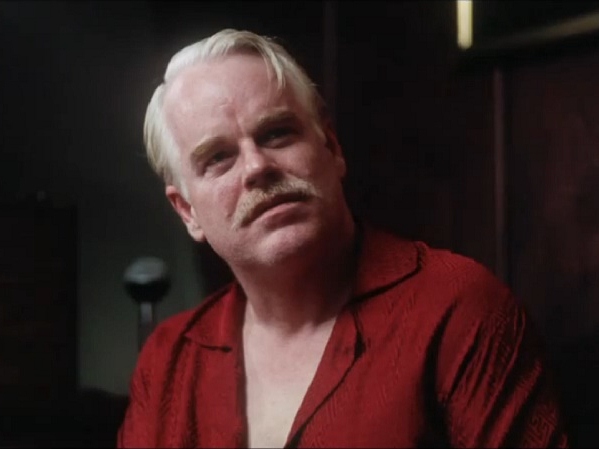
Director Paul Thomas Anderson’s cult-like following may earn him some extra huzzahs for his latest film project, but clear-eyed movie goers will see right through its striking imagery and unsettling score.
Anderson’s back log of good will is well earned, from the bravura “Boogie Nights” to the mesmerizing “There Will be Blood.”
In “The Master,” Anderson simply can’t keep up with his own ambitions, fashioning a technically superb movie that lacks emotional resonance. In non-auteur terms, it doesn’t connect with audiences.
Anderson casts Philip Seymour Hoffman as “The Master,” a cult leader with the magnificent moniker Lancaster Dodd. The fledgling leader of a moment dubbed “The Cause,” Dodd hopes to expand his influence in post-World War II America. Dodd embraces a 30-something man with two and three quarter strikes against him, an unspoken test subject for the glories of his new way of living.
Feral Freddie Quell (Joaquin Phoenix) is a war veteran with anger issues, a raging libido and little clue how to operate in society. Watch Freddie, working as a portrait photographer, snap at one of his subjects, and you’ll see why Dodd has very little to work with in the healing department.
Yet the two – one a quasi-brute, the other a thinker with delusions of grandeur – click in a way that a better film would have found fascinating.
Instead, “The Master” ransacks Anderson’s most intriguing talents without giving us a reason to care.
Hoffman mesmerizes as Dodd, making his small but loyal following a credible by-product of a leader’s vision. He’s a velvety smooth charlatan who appears to believe his own utterances. His occasional bursts of rage are terrifying, and the way he reaches out to lost souls like Freddie is actually touching.
The sessions where Dodd applies his craft are compelling, but their bizarre machinations do little to shed light on the people behind the methods.
Dodd’s wife (a superb Amy Adams) echoes her husband’s nutty, simplistic philosophies (make a goal for yourself and then achieve it, she tells Freddie as if stumbling upon a magic elixir). We don’t see any real reason why The Cause is worth more than any other self-help movement.
“The Master” serves up sly allusions to Scientology without directly addressing the matter. To do more would engulf the project in the kind of commotion few films could survive, frankly.
As is, the existing connections serve the story well. The missing pieces are found elsewhere, namely character arcs worth our attention and humanistic shadings that would allow us to embrace the film on a crucial level.
Phoenix, last seen in the useless mockumentary “I’m Still Here,” performs as if knowing he lost out on several film roles with the incident and is making up for lost time. His Freddie is an actor’s parlor game, and in every scene his gestures betray his craft. He’s “acting” with a capital “A,” and his presence is a near-constant distraction.
Worst of all, the film’s final act sheds light on a component of the Master/protege connection that feels unearned, even illegitimate.
“The Master” will leave you with several powerful images, like Phoenix demolishing a jail cell toilet while Hoffman looks on, bemused. The film’s score nestles under your skin without any warning. The story in play will surely be forgotten long before the aforementioned elements fade away.
Follow Christian Toto on Twitter @TotoMovies

COMMENTS
Please let us know if you're having issues with commenting.